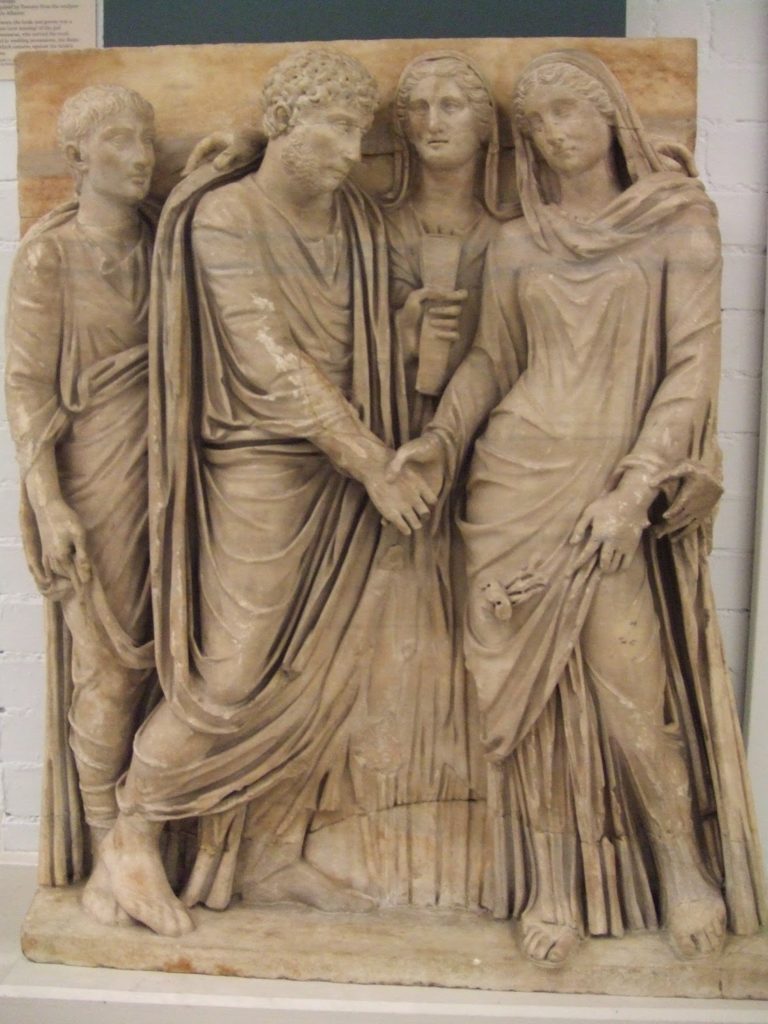Translated by Steven J. Willett

This is a Roman plaque that depicts a marriage with the husband holding the contract and a representative of each family observing the ceremony.
Note: The elegy is a birthday present for Tibullus’ good friend Cornatus. We know nothing about him other than what we learn in II.2 and the much longer elegy to him in II.3. There is a possibility, but free of evidence, that he may be identified with M. Caecilius Cornatus, who appears along with Messalla as a member of the Fratres Arvales in an inscription dated 21 or 20 BC. If our Cornatus is an Arval Brother, he is probably older than 40. The god Natalis is the Birthday Spirit who oversees Cornatus’ marriage prayers. The Genius mentioned on l. 5 is each man’s guardian spirit. See Horace’s description of Genius in Epistles 2.2: 189~90.
The elegy is a remarkably moving tribute to the mutually faithful marriage that love can bring some, but never did, to Tibullus in his constant search for “marble-constant” Amore.
We speak auspicious words: Natalis is coming to the altar: whoever's present, tongues, both man and woman, hold. Let us burn sacred incense on braziers, burn perfumery the Arabs send to us from opulent land. Let the Genius now be present to observe his honors, whose sacred hair the upple garlands adorn. With purest spikenard trickling from his temples, and let him overflow with cakes and wine. May he nod assent, Cornutus, to whatever you'll ask. Look, act (Why do you loiter? He nods)--so ask! I prophesy you'll pray for faithful love of a wife: (I think the gods already learned that prayer.) You never would prefer, whatever's on our entire earth, the fields strong peasants plow with straining ox, and not the precious gems from wealthy India produced, where waves in eastern oceans blush. Your prayers befall: I wish on rustling wings flies here and golden bonds of marriage gives you Love, bonds that may endure forever, until tardy old age will bring you wrinkles and inflict the hair. May he, Natalis, come as a bird and provide offspring, a troop of children playing at your feet.

I may have my Messallas confused, but I think the Messalla who was one of the Arval Brethren was the consul and senator, not the soldier and Tibullus’ patron (?)
As I wrote in my note, the Cornutus in question is probably the M. Caecilius M. f. Gal. Cornutus who appears with Messalla Corvinus in a Fratres Aruales inscription (CIL 6.32338) dated 21/20BC. The following scholars accept this Cornutus: Cichorius (1922) 264, Scheid (1975) 13ff., Cairns (1979) 130 n.36. Family and career are given by Cairns (1988)b 229~30. Murgatroyd in his edition of Tibullus Elegies Book II (1994) summarizes all the evidence in the Introduction xvi~xvii and rather slightly sides with the others above.
He makes it out a divine gift, garnered through faith (prayer) and rectitude (nothing more valued). It is plain spoken and yet so lofty and inspiring.
Yes, that’s my feeling exactly. Tibullus (c.55~19BC) was an eques and, like Vergil and Propertius, most of his estate had been confiscated in 41BC by Mark Antony and Octavion for their soldiers. He would have been only 14 when suffering the loss. He served with his patron Marcus Valerius Messalla Corvinus on a military mission c.30BC to Aquitania and during a later mission probably in 28BC he fell sick and was left to recover in Corcyra. I’ve translated his two antiwar elegies that reflect those experiences. Tibullus knew war very well, but preferred the country life as a farmer. He died prematurely and, as an elegiac poet in search of constant love, he never found it.